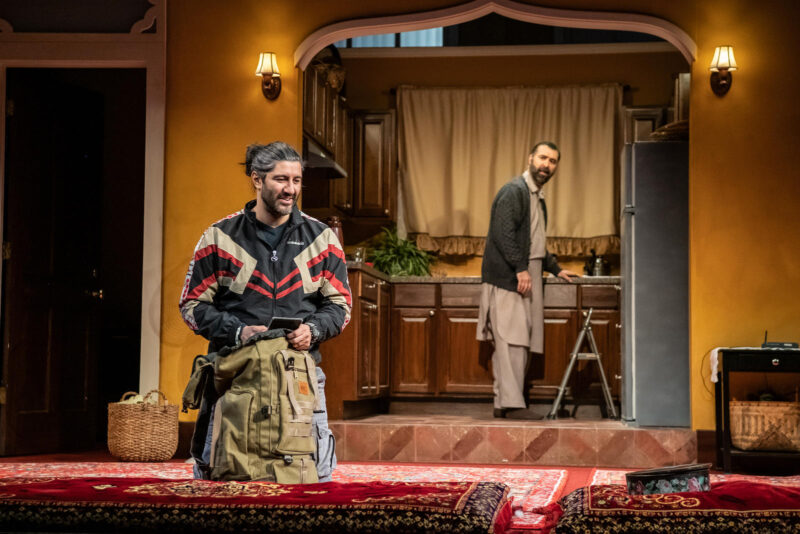The Price of Selling Kabul
Review of Selling Kabul presented by Seattle Rep
Written by Teen Writer Kyle Gerstel and edited by Teen Editor Triona Suiter

Entering Seattle Rep’s Leo K. Theater, I could taste the stage: Lex Marcos’ scenic design is immersive yet intimate and textured without overwhelming the senses. The play takes place in an apartment in Afghanistan and Marcos cleverly incorporates a second layer of windows in an adjacent building, which enhances and broadens the world of the story. In addition, the apartment itself has remarkable depth, with doors, a hallway, and a kitchen separate enough to be believable while managing to fit the stage. Once the play started, D.R. Amromin’s evocative soundscape and Geoff Korf’s escalating lighting elements only drew me in more.
Selling Kabul explores the ethical and emotional consequences of valuing one life over another. It follows an Afghani interpreter for the U.S. Army as he hides from the Taliban in his sister’s apartment.
The play was a finalist for the 2022 Pulitzer Prize for Drama, but I believe playwright Sylvia Khoury’s script was the weakest part of the experience. Despite Seattle Rep’s top-notch production quality, I was bored by the inconsistent dialogue and failed attempts at suspense.

The play starts quietly and my first instinct was that I was in for a subtle, socially relevant comedy-drama in the style of 2022 Best Picture CODA. However, the nothingness continued with some formulaic twists in between. Thus, in contrast with extended sequences of unnecessary dialogue, these reveals feel manipulative. I appreciate that Khoury focuses on delivering the story rather than trying to add in superfluous political commentary, but the plot was not stimulating enough on its own to keep my attention.
Although the script could easily be interpreted as a thriller, director Valerie Curtis-Newton mostly paces the show as a drama. This allows her to ground the story in its emotional stakes rather than the plot’s schemes and deceptions, but the absence of depth to unravel contributed to my tiresome viewing experience.
There are quite a few times in which actors look at the audience wistfully or for comedic effect, breaking the world of the play (intentional or not). I’m not sure whether Khoury wrote these stage directions or if Curtis-Newton is responsible, but the moments are off-putting either way.
The script’s tasteful humor relies mostly on relatability, so while I noticed quite a few older audience members laughing, my teenage friend and I sat silently. In addition, the dialogue gave us tonal whiplash with its uneven shifts from realism to eyeroll-worthy poetry. The play’s climax exemplifies this, featuring a hyperbolic monologue about love that seems too over-the-top and out of place to be sincere.

However, the ensemble cast is remarkable, particularly Awesta Zarif, who played Afiya during the performance I saw. Her portrayal of Taroon’s caring sister is sympathetic and nuanced. Fatima Wardak and Barzin Akhavan also contribute to the storytelling experience, but their performances are not as refined as Zarif’s.
Playing Taroon, the Afghani interpreter, Yousof Sultani exaggerates every emotional beat to the point that I struggled to tell when he was laughing and when he was crying. During the silent opening, I found this intriguing, but his dialogue was overacted.
I really wanted to enjoy Selling Kabul, but its brilliant design elements, conceptual potential and mostly strong ensemble cannot make up for the slow narrative and erratic writing.
Lead Photo: Photo by Nate Watters of Seattle Rep's Selling Kabul.
The TeenTix Newsroom is a group of teen writers led by the Teen Editorial Staff. For each review, Newsroom writers work individually with a teen editor to polish their writing for publication. The Teen Editorial Staff is made up of 6 teens who curate the review portion of the TeenTix blog. More information about the Teen Editorial Staff can be found HERE.
The TeenTix Press Corps promotes critical thinking, communication, and information literacy through criticism and journalism practice for teens. For more information about the Press Corps program see HERE.


